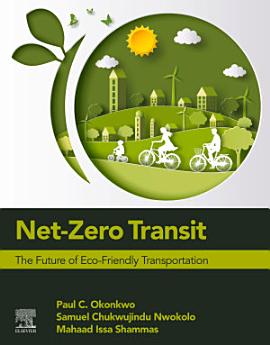Net-Zero Transit: The Future of Eco-Friendly Transportation
Aug 2025 · Elsevier
Ebook
340
Pages
family_home
Eligible
info
infoThis book will become available on August 1, 2025. You will not be charged until it is released.
About this ebook
Net-Zero Transit: The Future of Eco-Friendly Transportation thoroughly examines the possible future of environmentally friendly transportation, presenting creative approaches and tactics to attain a transit sector with no net emissions. The book explores the convergence of technology, politics, and consumer behavior to provide a comprehensive perspective on achieving environmentally friendly transportation worldwide. The authors illustrate the practicality and advantages of adopting environmentally friendly transportation systems through the examination of real-life examples and the analysis of data.The authors offer practical assistance for establishing sustainable practices in the transit sector by emphasizing successful efforts and innovative solutions. In addition, they provide valuable perspectives on possible obstacles and hurdles that may occur throughout the shift towards achieving net-zero emissions, as well as suggestions for effectively addressing and surmounting them. It uses theoretical analysis and case studies to explore the benefits and challenges of transitioning to a zero-net-carbon transportation system. The economic, social, and environmental impacts of transitioning to net-zero transit are discussed, including the role of government policies, public-private partnerships, and community engagement. The analytical framework of this book encompasses several scenarios, such as the implementation of carbon policy, carbon pricing, carbon offset programs, climate-conscious car-flight-marine pooling, climate-conscious car-flight-marine green gridlock, pedal-walking power progress, and future-proof transportation. It employs real historical datasets from different countries and regions across the globe to forecast future emissions from various transportation modes using a range of machine learning techniques.This book is an invaluable resource for legislators, industry experts, and individuals seeking to promote environmentally friendly transportation solutions and contribute positively to the environment. Its detailed analysis offers actionable insights to policymakers and stakeholders in the transportation industry, enabling them to make well-informed decisions regarding measures to reduce emissions. - Includes stimulating conversations regarding the ecological consequences of conventional transportation techniques and the pressing necessity for a transition towards environmentally sustainable transportation - Thoroughly examines the policy consequences and regulatory systems that endorse carbon-neutral transportation - Provides practical suggestions for individuals, corporations, and governments seeking to decrease their carbon emissions by using innovative transportation solutions - Represents a visionary aspiration for a future in which transportation is not just efficient and convenient but also environmentally sustainable and socially just
About the author
Dr. Paul C. Okonkwo is an Associate Professor at the Department of Mechanical and Mechatronic Engineering at Dhofar University in Salalah, Oman. His research focuses on renewable energy and on exploring innovative solutions that address the pressing challenges of sustainable development. With wide-ranging experience in environmental engineering, corrosion, failure analysis, tribology, and renewable energy, Dr. Okonkwo has taught at universities and conducted research projects across the Middle East, Africa, and Australia. He has published 12 conference papers, 8 book chapters, and over 70 research articles in internationally recognized journals, as well as speaking at major conferences and working on significant grant-funded research projects. Dr. Okonkwo was previously a postdoctoral researcher at Qatar University (Qatar) and Deakin University (Australia), and was previously awarded the UNESCO/CHINA: The Great Wall Fellowship Award as a Senior Research Scholar.Samuel Chukwujindu Nwokolo holds a Bachelor's degree, a Postgraduate Diploma (PGD) in Physics (renewable energy option), and MSc. Atmospheric Physics/Meteorology (In View). His dedication to raising awareness about renewable energy's potential to combat climate change is evident through his numerous speaking engagements, publications, and active involvement in various environmental organizations. His research has covered aspects of Solar Energy, Smart Energy Systems, and Sustainable Development Studies (sustainable cities and resources, building integrated photovoltaics for sustainable architecture). He has published more than 58 research articles in many reputed journals. He is the author of three academic books and a reviewer for Renewable and Sustainable Energy Reviews, Applied Energy, IOP Environmental Research Letter, IOP Progress in Energy, MDPI Atmosphere, Heliyon, International Journal of Ambient Energy, International Journal of Green Energy, and other journals.Dr. Mahaad Issa Shammas is an Associate Professor at Dhofar University in Salalah, Oman, specializing in environmental engineering and sustainable improvement solutions. Dr. Shammas completed his Ph.D. in Land and Water Resources Engineering in 2007 and his M.Sc. in Environmental Engineering and Sustainable Infrastructure in 1998. His teaching portfolio spans various courses, including Environmental Engineering, Engineering Hydrology, Water and Wastewater Treatment Engineering Geology, Solid Waste Management, Water and Wastewater Treatment Lab Fluid Mechanics Lab, Air Pollution Control, Environmental Control in Buildings, Environmental Education, and Engineering Ethics. Dr. Shammas has a rich background in environmental affairs, contributing significantly during his 25-year tenure at the Ministry of Environment and Climate Affairs (MECA) in Oman. He also held a leadership role as the Deputy General Manager at Carmeuse Majan LLC. Dr. Issa is currently working on sustainable infrastructure research, including green building materials and renewable energy sources.
Reading information
Smartphones and tablets
Install the Google Play Books app for Android and iPad/iPhone. It syncs automatically with your account and allows you to read online or offline wherever you are.
Laptops and computers
You can listen to audiobooks purchased on Google Play using your computer's web browser.
eReaders and other devices
To read on e-ink devices like Kobo eReaders, you'll need to download a file and transfer it to your device. Follow the detailed Help Center instructions to transfer the files to supported eReaders.




